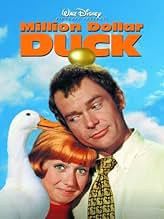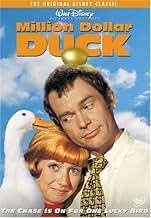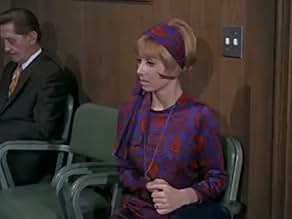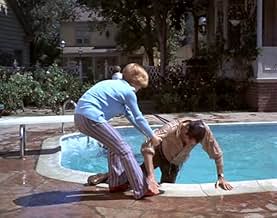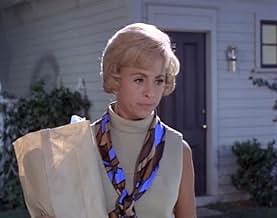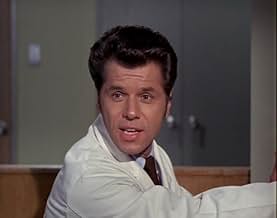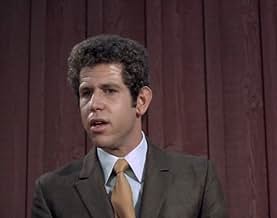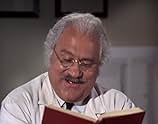AVALIAÇÃO DA IMDb
5,8/10
2,9 mil
SUA AVALIAÇÃO
Adicionar um enredo no seu idiomaProfessor Dooley takes home a duck from his research laboratory as a pet for his son, but soon finds out that it lays golden eggs.Professor Dooley takes home a duck from his research laboratory as a pet for his son, but soon finds out that it lays golden eggs.Professor Dooley takes home a duck from his research laboratory as a pet for his son, but soon finds out that it lays golden eggs.
- Prêmios
- 2 indicações no total
Lee Montgomery
- Jimmy Dooley
- (as Lee Harcourt Montgomery)
Peter Renaday
- Mr. Beckert
- (as Pete Renoudet)
- Direção
- Roteiristas
- Elenco e equipe completos
- Produção, bilheteria e muito mais no IMDbPro
Avaliações em destaque
And it turns out that a few years later two University of Michigan professors managed to create pure 24-karat gold in the laboratory in 2012, and in 2020 a group of Swiss scientists managed to create an incredibly light type of 18-karat gold, the gold losing its value. In 3, 2, 1... Very cute movie, the family trio, dad, mom and son are cute, the lawyer friend too, and the sustainable evildoers... Cute...
That eternal Disney lead, Dean Jones, plays a harried scientist named Albert Dooley who's constantly sweating out bills. Then fortune arrives in an odd way. He's brought home a research animal named "Charlie", a white duck to whom Alberts' son Jimmy (Lee Montgomery) becomes attached. But Charlie was exposed to radiation after wandering into a laboratory, and now is capable of laying golden eggs. So naturally Albert and his lawyer buddy Fred (Tony Roberts) get dollar signs in their eyes. But their actions catch the attention of federal agents, led by James Gregory as Rutledge, who want to know how these private citizens are coming into possession of this gold.
"The Million Dollar Duck" is standard live-action Disney fare from this period. It's not a classic of its kind, rarely producing any true belly laughs, but it's amiable enough and amusing enough to keep it watchable for 93 minutes. Like many a Disney comedy, it builds up to a frantic chase sequence that does get over the top in a reasonably funny way. The movie does deserve some credit, though, for revolving around not a dog or cat but a different species. And the duck herself is endearing, and the human cast goes through their paces with efficiency. Joe Flynn is an irritable treasury agent and next-door neighbour, Sandy Duncan the somewhat air-headed, miniskirt-wearing wife / mother, Jack Kruschen is Alberts' boss at his lab, and Virginia Vincent plays Flynn's wife. Per Disney's style, familiar character actors in small parts do perk things up a little: Arthur Hunnicutt, Frank Wilcox, Bing Russell, Frank Cady, Hal Smith, Edward Andrews, Bernard Fox, Arthur Franz, Bruno VeSota, etc.
While never really inspired, there's enough good-natured mayhem here to make this palatable viewing for the intended family audience.
Six out of 10.
"The Million Dollar Duck" is standard live-action Disney fare from this period. It's not a classic of its kind, rarely producing any true belly laughs, but it's amiable enough and amusing enough to keep it watchable for 93 minutes. Like many a Disney comedy, it builds up to a frantic chase sequence that does get over the top in a reasonably funny way. The movie does deserve some credit, though, for revolving around not a dog or cat but a different species. And the duck herself is endearing, and the human cast goes through their paces with efficiency. Joe Flynn is an irritable treasury agent and next-door neighbour, Sandy Duncan the somewhat air-headed, miniskirt-wearing wife / mother, Jack Kruschen is Alberts' boss at his lab, and Virginia Vincent plays Flynn's wife. Per Disney's style, familiar character actors in small parts do perk things up a little: Arthur Hunnicutt, Frank Wilcox, Bing Russell, Frank Cady, Hal Smith, Edward Andrews, Bernard Fox, Arthur Franz, Bruno VeSota, etc.
While never really inspired, there's enough good-natured mayhem here to make this palatable viewing for the intended family audience.
Six out of 10.
It is fashionable to rag and bash this movie. The points are understood. Take 1930's cornball humor, mix in the physical comedy of the Stooges and Keystone Cops, with the backdrop of a story from Antiquity, the goose who laid the golden eggs. Place it in modernity, being more the generic mid 20th Century with a lawyer and US Treasury folks. It's 1971, but the movie appears to ignore the changing outside world. The 'far out dudes' Wadlo boys give a wink to the Hippy Era, but not much else. It's small town California, a point which is made deliberately, which ironically harkens back to then President Nixon's growing up. Gold and small towns, one only can imagine if any super seniors from rural America ever saw this at the time. Gold was no giver to prosperity in their eyes, Williams Jennings Bryan and 'free silver' were all the rage.
The movie suffers from terrible timing. A huge shift in taste was sweeping the country, as this is more in tune with the rural sitcoms of the late 60's, recently purged, and less with the new 'dramadies' of 'All in the Family' and 'MASH.' If you remember 'Get Smart,' you might forgive some of the 'cheese' here. The silly chase scene at the end, who does that in a movie ? Hummm, 'The French Connection' (picture of the year in 1971) ? This wasn't a hip time to be a young kid, I'm of the X'er generation. It wasn't like the late 50's/early 60's (Boomers) or the 90's (Millennials), time periods hailed for Disney creativity.
If you're reading this, you probably have some appreciation for the humanities...some history and motifs of literature. Let's look at this differently. First, the characters. Sandy Duncan as the flighty housewife sends the critics into orbit. 'All in the Family' used this characterization as satire, here and even in 1971, it's uncomfortable. Let's say that's just a misunderstood bit of humor and exaggeration. For wide acceptance...a miss, ok. Joe Flynn checks in with his staple uptight bureaucrat as the Treasury agent. Dean Jones, the 'everyman' father and family man. An image he would work with on other more successful Disney films. Tony Roberts launched his film career as his slippery lawyer, works well for even modern audiences. The rest of the cast is rounded out with some longtime Hollywood figures, mostly of the past.
Some imagery and motifs. Mrs. Dooley gets a phone call from the bank one morning, because she's 'overdrawn' on her checking account. A crusty old 'banker' threatens to call her husband. Charlie the duck...offers a deposit. At the teller window, a balding middle aged guy with a three piece suit. Not too far fetched for small town banking in the late 60's, circa 1970. Not that unlike the experience of their parents in the 40's. Those old guys probably cut the Dooley's mortgage years ago. Fast forward thirty years later ? ATM's, online banking, mortgages cut from online services, tellers 20-something ladies with a blouse from Target and if you ask an officer at the bank too many questions besides hours and building address, they'll reach for the phone and call the 1-800 number. Later in the film, with the Feds ponder keeping the golden Charlie a secret, the first foreigner on the montage is French, notorious in the era for collecting US gold to settle trade debts. When the Dooleys and Fred arrange chase, the call Katie gets is on...a RED phone. Later, when the Feds are caught up in a traffic accident and announce to the crowd they're with the government, one patron says, 'Government ! No wonder you got everything all loused up !' A cynicism more fitting to the late 70's rather than on the heels of the 'go/go 60s'
Lastly the gold politics. We're in small town California here. Although McKinley's 'gold bugs' won California against Bryan 'free silver,' in 1896, gold was of the New York bankers and big city industrialists. Worker bees and farmers chose inflation supported 'free silver.' But, in 1971, the gold standard was on its deathbed. Mr. Nixon, who 'appears' in the movie, would take us off the gold standard entirely within a few years. So, own all the gold you want, as we go total fiat currency, a world none of the creators really lived through. The yellow sports car would never go for 7,995 dollars again.
The movie suffers from terrible timing. A huge shift in taste was sweeping the country, as this is more in tune with the rural sitcoms of the late 60's, recently purged, and less with the new 'dramadies' of 'All in the Family' and 'MASH.' If you remember 'Get Smart,' you might forgive some of the 'cheese' here. The silly chase scene at the end, who does that in a movie ? Hummm, 'The French Connection' (picture of the year in 1971) ? This wasn't a hip time to be a young kid, I'm of the X'er generation. It wasn't like the late 50's/early 60's (Boomers) or the 90's (Millennials), time periods hailed for Disney creativity.
If you're reading this, you probably have some appreciation for the humanities...some history and motifs of literature. Let's look at this differently. First, the characters. Sandy Duncan as the flighty housewife sends the critics into orbit. 'All in the Family' used this characterization as satire, here and even in 1971, it's uncomfortable. Let's say that's just a misunderstood bit of humor and exaggeration. For wide acceptance...a miss, ok. Joe Flynn checks in with his staple uptight bureaucrat as the Treasury agent. Dean Jones, the 'everyman' father and family man. An image he would work with on other more successful Disney films. Tony Roberts launched his film career as his slippery lawyer, works well for even modern audiences. The rest of the cast is rounded out with some longtime Hollywood figures, mostly of the past.
Some imagery and motifs. Mrs. Dooley gets a phone call from the bank one morning, because she's 'overdrawn' on her checking account. A crusty old 'banker' threatens to call her husband. Charlie the duck...offers a deposit. At the teller window, a balding middle aged guy with a three piece suit. Not too far fetched for small town banking in the late 60's, circa 1970. Not that unlike the experience of their parents in the 40's. Those old guys probably cut the Dooley's mortgage years ago. Fast forward thirty years later ? ATM's, online banking, mortgages cut from online services, tellers 20-something ladies with a blouse from Target and if you ask an officer at the bank too many questions besides hours and building address, they'll reach for the phone and call the 1-800 number. Later in the film, with the Feds ponder keeping the golden Charlie a secret, the first foreigner on the montage is French, notorious in the era for collecting US gold to settle trade debts. When the Dooleys and Fred arrange chase, the call Katie gets is on...a RED phone. Later, when the Feds are caught up in a traffic accident and announce to the crowd they're with the government, one patron says, 'Government ! No wonder you got everything all loused up !' A cynicism more fitting to the late 70's rather than on the heels of the 'go/go 60s'
Lastly the gold politics. We're in small town California here. Although McKinley's 'gold bugs' won California against Bryan 'free silver,' in 1896, gold was of the New York bankers and big city industrialists. Worker bees and farmers chose inflation supported 'free silver.' But, in 1971, the gold standard was on its deathbed. Mr. Nixon, who 'appears' in the movie, would take us off the gold standard entirely within a few years. So, own all the gold you want, as we go total fiat currency, a world none of the creators really lived through. The yellow sports car would never go for 7,995 dollars again.
"The Million Dollar Duck" is a silly but fun fantasy comedy. In spite of some critics' disdain for such movies - if they are for kids (they don't seem to mind the silly adult films). This one was pleasing enough for kids and adults. Disney wasn't the only studio that saw a market for such comical films mostly during the 1960s through 1980s.
The adult humor is here as well, but it may not register with many in 21st century audiences. Indeed, this film shows something of American culture that has changed. Through the middle of the last century - after WW II and well into the 1970s, one of the staples of humor was the Internal Revenue Service and government taxes. People of all stripes, but mostly common, everyday folks and hometown businessmen complained about government taxes. One couldn't go into a bar, barbershop, cafe or drug store and not hear someone lamenting the government tax burden. Government employees indeed were not very favorably regarded, whether with the IRS or not.
One suspects that the culture change by the late 20th century is what brought an end to such commonplace disdain. The transformation to mostly two-income households had lifted many more people above the subsistence level. So, most families spend more and can afford more things. Ergo, less complaint about Uncle Sam taking too much.
Still, a college research professor in 1971 should have made a sufficient salary to support a family of three fairly comfortably. But, not so in this film. The name of his office on the door to Albert Dooley's (Dean Jones) lab reads, "Psycho Bio Research Laboratory." All of the cast are good in their roles. Sandy Duncan is funny early on as the slightly dingy Katie Dooley. Watching her make applesauce in the kitchen is a hoot. And Dean Jones's reaction is hilarious.
James Gregory is very funny as the stuffy Treasury head. And, Edward Andrews plays the worried, angst-filled representative of the Federal Reserve Bank, Morgan, superbly. Tony Roberts is especially good as the crafty lawyer neighbor and friend who can't take his own advice. If one watches closely, there's no little amount of spoofing in this film. Not just about government agents, but lawyers and others as well.
One of the humorous criticisms I can recall from around that time had to do with government grants. One instance went something like this - while some people were out of work, others were homeless, and small businesses were struggling to keep going, the government awarded a $140,000 grant to study the mating habits of frogs. I wonder if Albert Dooley's place of employment wasn't intended as a little jab at government along those lines.
This film isn't packed with laughter scenes, or with witty lines or silly situations. It has a little bit of each, and should bring a smile to most kids and adults even well into the 21st century.
In some places, the movie is slow. And a vehicle chase scene with Jones hanging on to a utility truck ladder is quite old. It had been done in so many films before that it just doesn't seem funny this time. Here are some favorite lines.
Katie Dooley, "Jimmy, don't bother your father with that now. He's got little enough on his mind as it is."
Jimmy Dooley, "Mr. Hooper next door... he has a dog. He can afford to feed it. It's a great big one." Albert Dooley, "Mr. Hooper next door works for the U.S. Treasury and they have all our money. He could afford a giraffe."
Finley Hooper, "I wish that fool professor made enough money so I could investigate him."
Dr. Gottlieb, "Excuse me. I have to go recheck the IQ of this chimp - a hundred and forty, higher than mine."
Fred Hines, "Look Al, sweetheart. I'm only trying to save you money. I mean by making me a partner, you'll save paying me all those exorbitant lawyer's fees."
The adult humor is here as well, but it may not register with many in 21st century audiences. Indeed, this film shows something of American culture that has changed. Through the middle of the last century - after WW II and well into the 1970s, one of the staples of humor was the Internal Revenue Service and government taxes. People of all stripes, but mostly common, everyday folks and hometown businessmen complained about government taxes. One couldn't go into a bar, barbershop, cafe or drug store and not hear someone lamenting the government tax burden. Government employees indeed were not very favorably regarded, whether with the IRS or not.
One suspects that the culture change by the late 20th century is what brought an end to such commonplace disdain. The transformation to mostly two-income households had lifted many more people above the subsistence level. So, most families spend more and can afford more things. Ergo, less complaint about Uncle Sam taking too much.
Still, a college research professor in 1971 should have made a sufficient salary to support a family of three fairly comfortably. But, not so in this film. The name of his office on the door to Albert Dooley's (Dean Jones) lab reads, "Psycho Bio Research Laboratory." All of the cast are good in their roles. Sandy Duncan is funny early on as the slightly dingy Katie Dooley. Watching her make applesauce in the kitchen is a hoot. And Dean Jones's reaction is hilarious.
James Gregory is very funny as the stuffy Treasury head. And, Edward Andrews plays the worried, angst-filled representative of the Federal Reserve Bank, Morgan, superbly. Tony Roberts is especially good as the crafty lawyer neighbor and friend who can't take his own advice. If one watches closely, there's no little amount of spoofing in this film. Not just about government agents, but lawyers and others as well.
One of the humorous criticisms I can recall from around that time had to do with government grants. One instance went something like this - while some people were out of work, others were homeless, and small businesses were struggling to keep going, the government awarded a $140,000 grant to study the mating habits of frogs. I wonder if Albert Dooley's place of employment wasn't intended as a little jab at government along those lines.
This film isn't packed with laughter scenes, or with witty lines or silly situations. It has a little bit of each, and should bring a smile to most kids and adults even well into the 21st century.
In some places, the movie is slow. And a vehicle chase scene with Jones hanging on to a utility truck ladder is quite old. It had been done in so many films before that it just doesn't seem funny this time. Here are some favorite lines.
Katie Dooley, "Jimmy, don't bother your father with that now. He's got little enough on his mind as it is."
Jimmy Dooley, "Mr. Hooper next door... he has a dog. He can afford to feed it. It's a great big one." Albert Dooley, "Mr. Hooper next door works for the U.S. Treasury and they have all our money. He could afford a giraffe."
Finley Hooper, "I wish that fool professor made enough money so I could investigate him."
Dr. Gottlieb, "Excuse me. I have to go recheck the IQ of this chimp - a hundred and forty, higher than mine."
Fred Hines, "Look Al, sweetheart. I'm only trying to save you money. I mean by making me a partner, you'll save paying me all those exorbitant lawyer's fees."
This movie, also known by the alternative title "The $1,000,000 Duck", isn't clearly one of Disney's most solid films. It's not a great movie, but has its fun and originality.
The movie stars Dean Jones and Joe Flynn, both from "The Love Bug". The movie happens to be about an animal, but here's where its biggest originality is: it's not about a cat or a dog or other familiar animals in movies, but a duck! The duck is a cute and likable chap, but very strange. After wandering into a radiation lab, the duck becomes irradiated and many unusual things happen to it, such as to lay golden eggs. Before that, it was already a poor dumb duck.
Dean Jones portrays Professor Albert Dooley, the guy who takes the duck home to offer his son. His son becomes attached to the duck. But because of the whole golden eggs story, Albert Dooley becomes obsessed with the idea of becoming rich thanks to that, proving how people can get so easily greedy for money.
Then again, it's not a super movie, but has its moments, such as Dooley's giant car polluting the air like that and doing those engine noises when it stops (very much like Uncle Buck's car) and some moments with Joe Flynn. I also liked that nice and beautiful yellow sports car.
Almost at the end of the movie, there is a sequence that is all about a chase. The whole sequence is really nuts yet hilarious! While watching it, I couldn't help myself thinking «Damn, what a chase!».
The movie stars Dean Jones and Joe Flynn, both from "The Love Bug". The movie happens to be about an animal, but here's where its biggest originality is: it's not about a cat or a dog or other familiar animals in movies, but a duck! The duck is a cute and likable chap, but very strange. After wandering into a radiation lab, the duck becomes irradiated and many unusual things happen to it, such as to lay golden eggs. Before that, it was already a poor dumb duck.
Dean Jones portrays Professor Albert Dooley, the guy who takes the duck home to offer his son. His son becomes attached to the duck. But because of the whole golden eggs story, Albert Dooley becomes obsessed with the idea of becoming rich thanks to that, proving how people can get so easily greedy for money.
Then again, it's not a super movie, but has its moments, such as Dooley's giant car polluting the air like that and doing those engine noises when it stops (very much like Uncle Buck's car) and some moments with Joe Flynn. I also liked that nice and beautiful yellow sports car.
Almost at the end of the movie, there is a sequence that is all about a chase. The whole sequence is really nuts yet hilarious! While watching it, I couldn't help myself thinking «Damn, what a chase!».
Você sabia?
- CuriosidadesNear the conclusion of the movie, just before Jimmy captures Charlie the duck, there is a Volkswagen Beetle with the license plate OFP 857 and inside the vehicle is a Great Dane. The tag was the very same as Herbie's in Se Meu Fusca Falasse (1968), another Disney movie starring Dean Jones that was the first in a series of "Love Bug" films. The dog is the same breed as in Um Amor de Companheiro (1966), also starring Dean Jones.
- Erros de gravaçãoThe logo and attachment that is on the Centennial is not the Hyundai logo. The logo and attachment on that car both appear to resemble the Lincoln logo.
- Citações
Jimmy Dooley: I didn't want a duck! I wanted a puppy!
- Cenas durante ou pós-créditosDuring the opening credits, an animated duck lays six eggs. Then, it places a "1" and a "$ " before these eggs. After it adds commas, the eggs turn golden with a cash register sound. The third egg then expands and blends into the opening scene.
- ConexõesFeatured in Gus, uma Mula Fora de Série (1976)
Principais escolhas
Faça login para avaliar e ver a lista de recomendações personalizadas
- How long is The Million Dollar Duck?Fornecido pela Alexa
Detalhes
- Data de lançamento
- País de origem
- Central de atendimento oficial
- Idioma
- Também conhecido como
- Este Pato Vale Ouro
- Locações de filme
- Toluca Lake, Califórnia, EUA(pass the Post Office while riding on top of garbage truck)
- Empresa de produção
- Consulte mais créditos da empresa na IMDbPro
Bilheteria
- Faturamento bruto nos EUA e Canadá
- US$ 11.118.000
- Tempo de duração
- 1 h 29 min(89 min)
- Proporção
- 1.33 : 1
Contribua para esta página
Sugerir uma alteração ou adicionar conteúdo ausente


